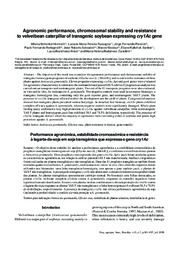Agronomic performance, chromosomal stability and resistance to velvetbean caterpillar of transgenic soybean expressing cry1Ac gene.
Agronomic performance, chromosomal stability and resistance to velvetbean caterpillar of transgenic soybean expressing cry1Ac gene.
Autoria: HOMRICH, M. S.; PASSAGLIA, L. M. P.; PEREIRA, J. F.; BERTAGNOLLI, P. F.; SALVADORI, J. R.; NICOLAU, M.; KALTCHUK-SANTOS, E.; ALVES, L. B.; BODANESE-ZANETTINI, M. H.
Resumo: The objective of this work was to analyze the agronomic performance and chromosomal stability of transgenic homozygous progenies of soybean [Glycine max (L.) Merrill.], and to confirm the resistance of these plants against Anticarsia gemmatalis. Eleven progenies expressing cry1Ac, hpt and gusA genes were evaluated for agronomic characteristics in relation to the nontransformed parent IAS 5 cultivar. Cytogenetical analysis was carried out on transgenic and nontransgenic plants. Two out of the 11 transgenic progenies were also evaluated, in vitro and in vivo, for resistance to A. gemmatalis. Two negative controls were used in resistance bioassays: a transgenic homozygous line, containing only the gusA reporter gene, and nontransgenic 'IAS 5' plants. The presence of cry1Ac transgene affected neither the development nor the yield of plants. Cytogenetical analysis showed that transgenic plants presented normal karyotype. In detached-leaf bioassay, cry1Ac plants exhibited complete efficacy against A. gemmatalis, whereas negative controls were significantly damaged. Whole-plant feeding assay confirmed a very high protection of cry1Ac against velvetbean caterpillar, while nontransgenic 'IAS 5' plants and homozygous gusA line exhibited 56.5 and 71.5% defoliation, respectively. The presence of cry1Ac transgene doesn't affect the majority of agronomic traits (including yield) of soybean and grants high protection against A. gemmatalis.
Ano de publicação: 2008
Tipo de publicação: Artigo de periódico
Unidade: Embrapa Trigo
Observações
1 - Por padrão são exibidas publicações dos últimos 20 anos. Para encontrar publicações mais antigas, configure o filtro ano de publicação, colocando o ano a partir do qual você deseja encontrar publicações. O filtro está na coluna da esquerda na busca acima.
2 - Para ler algumas publicações da Embrapa (apenas as que estão em formato ePub), é necessário ter, no celular ou computador, um desses softwares gratuitos. Sistemas Android: Google Play Livros; IOS: iBooks; Windows e Linux: software Calibre.
Acesse outras publicações
Acesse a Base de Dados da Pesquisa Agropecuária (BDPA) para consultar o acervo completo das bibliotecas da Embrapa.

